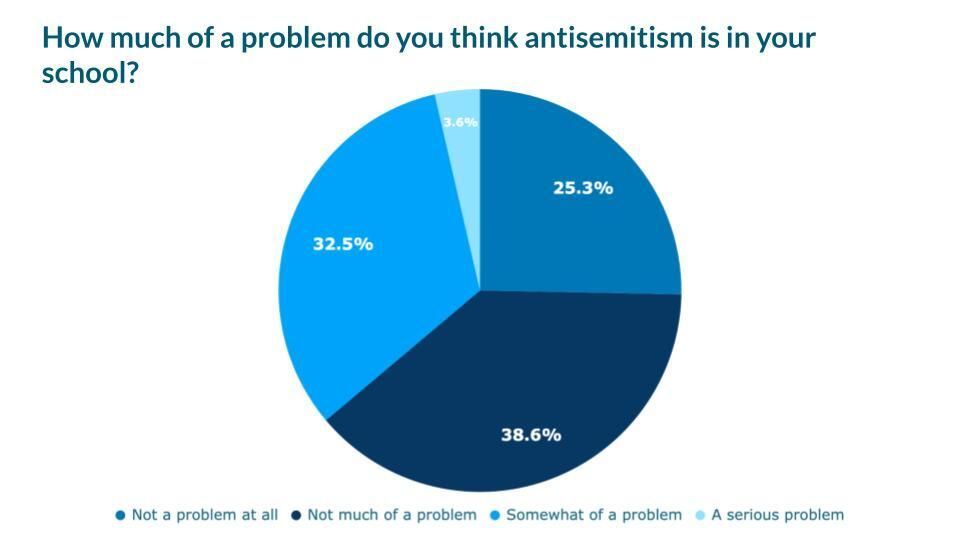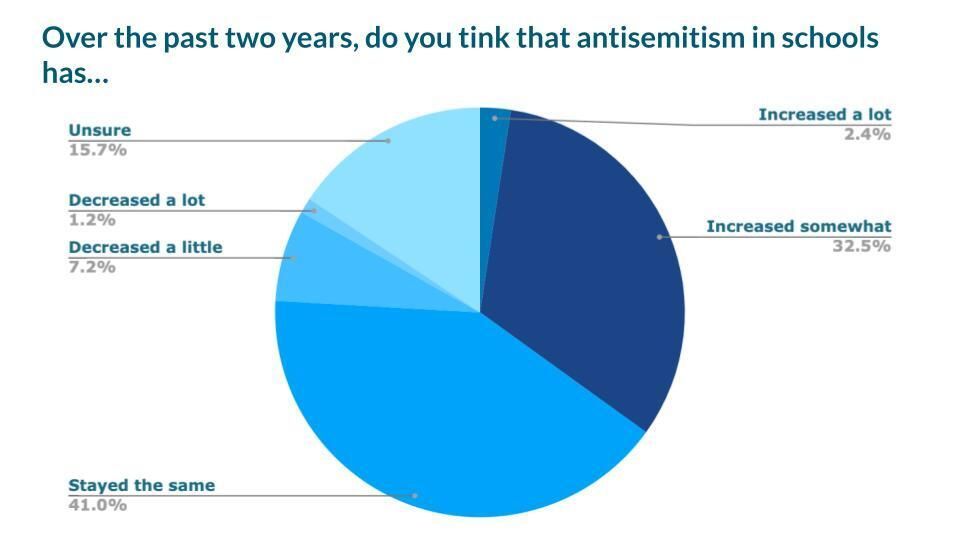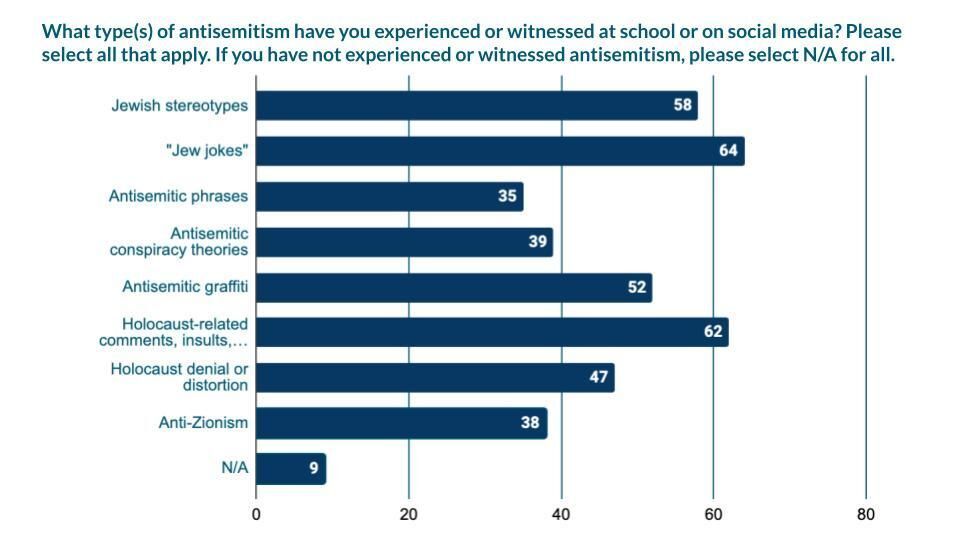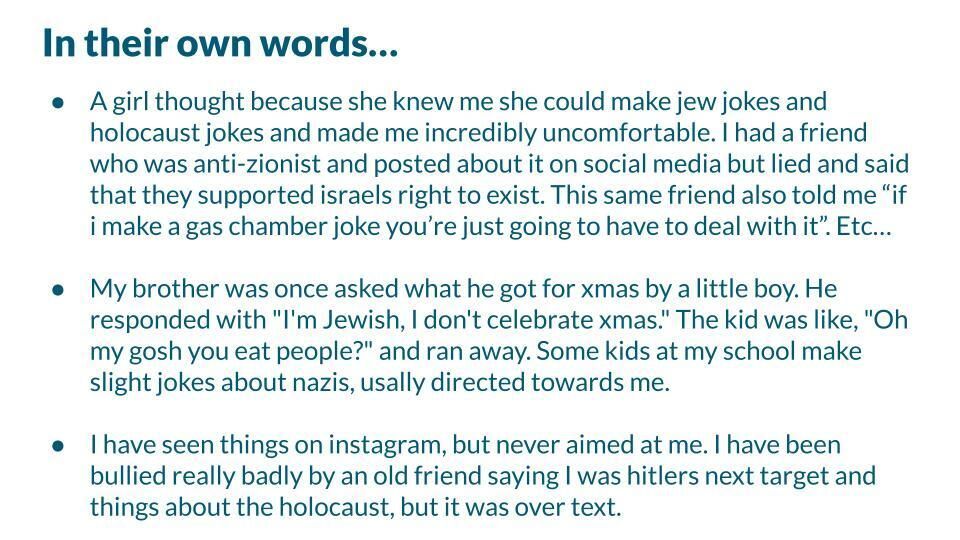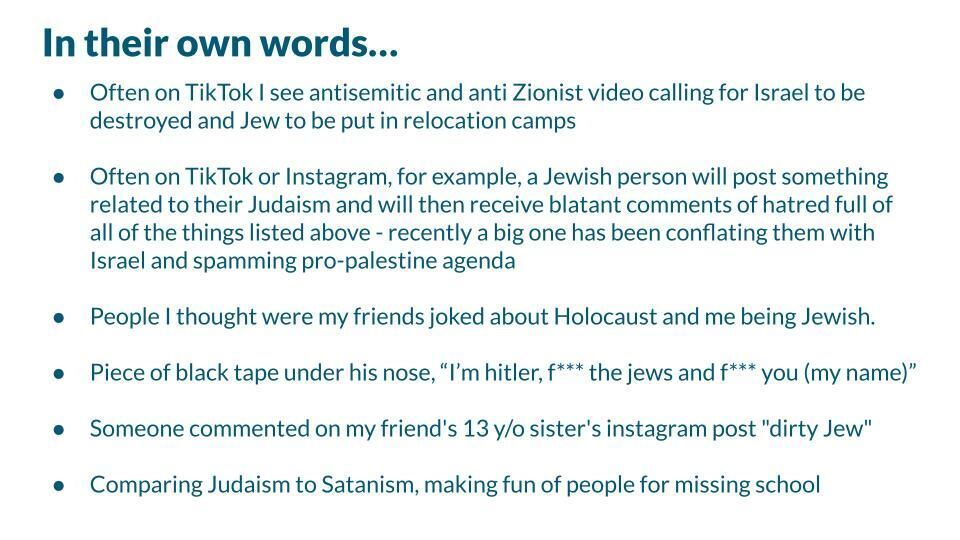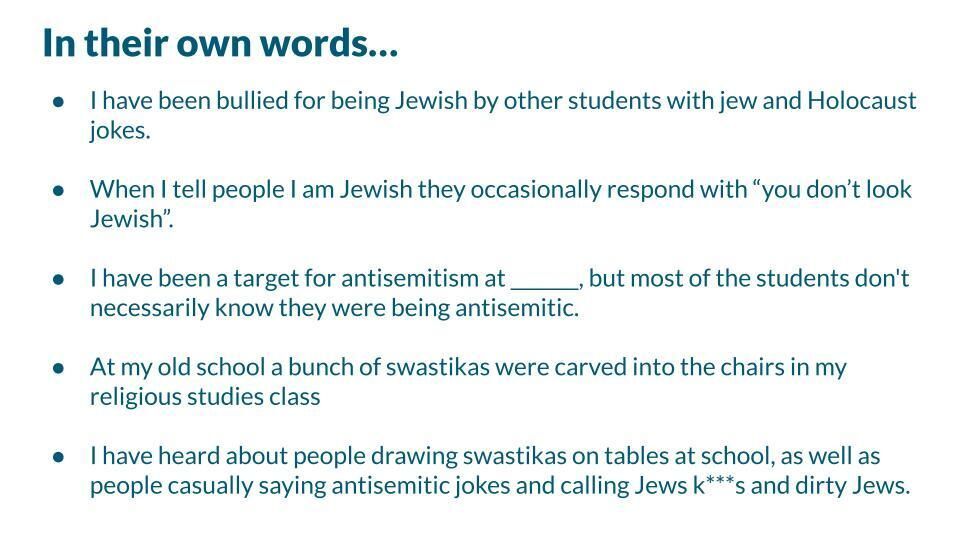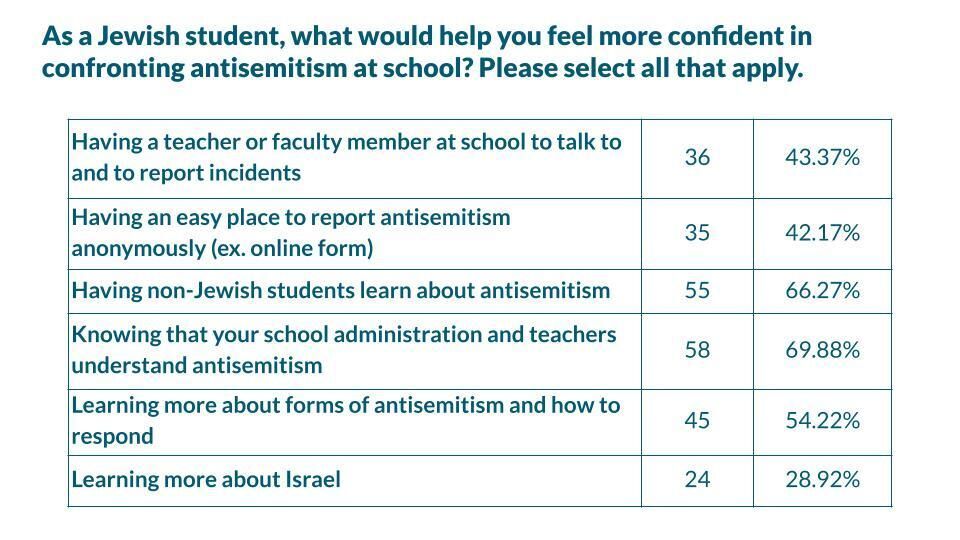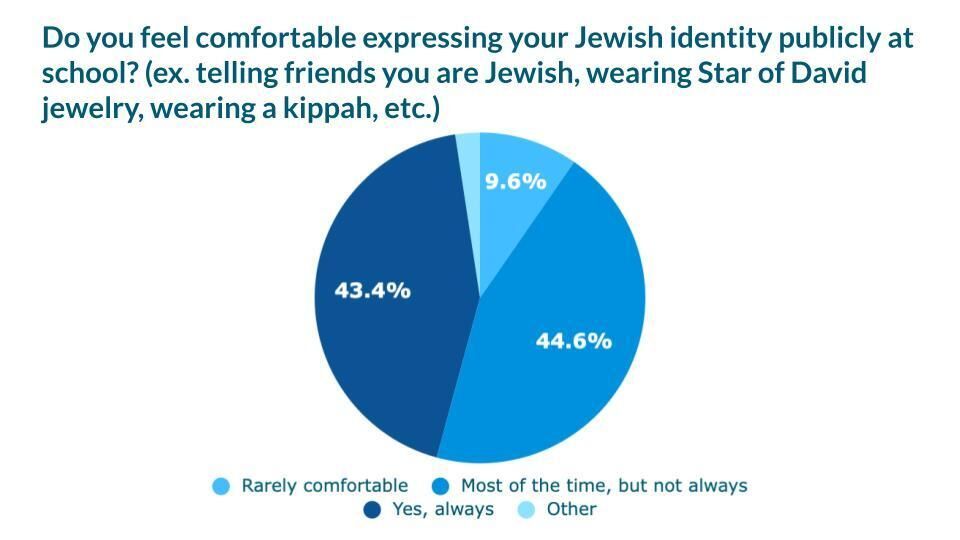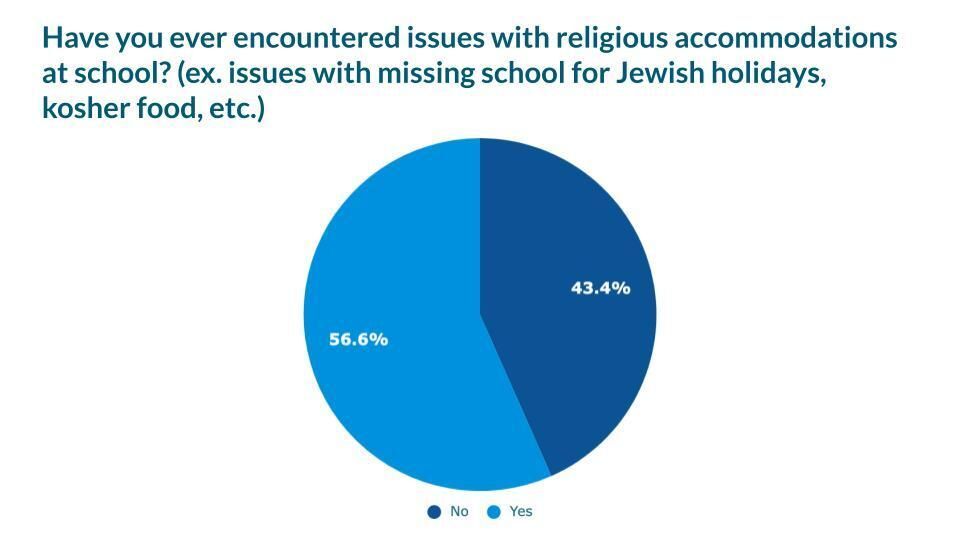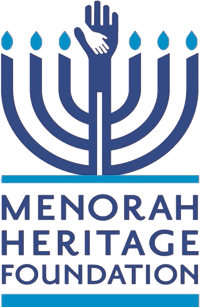2022 Antisemitism in Schools Survey
Motivation and Purpose
In August 2020, JCRB|AJC conducted its first-ever “Antisemitism in Schools” survey to gain a greater understanding of Jewish students’ experiences at school. The survey revealed that Jewish students in our region faced antisemitism on a disturbingly regular basis in their schools – 75% percent of students surveyed reported experiencing or witnessing antisemitism at school. The survey findings informed our “Prepare to Respond, Educate to Prevent” education initiatives, which have so far educated and empowered almost 1000 local Jewish students, teachers, and administrators.
Since 2020, we have witnessed increased Holocaust distortion throughout the pandemic and a surge in antisemitism following the outbreak of conflict between Israel and Hamas in May 2021. Overall, 2021 was the highest year on record for antisemitic incidents in the United States.
With the second “Antisemitism in Schools” survey, JCRB|AJC sought an updated understanding of what antisemitism looks like for Jewish students in 2022.
Student Demographics
We received 83 responses from a diverse range of students from public and private schools around the Greater Kansas City area, Lawrence, and Wichita.
Most respondents were high school students; 29% were middle school students.
Key Findings
-
Only 25% of students said antisemitism was “not a problem at all” in their school.
-
35% of students said antisemitism in schools has increased over the past two years. 41% of students said antisemitism had “stayed the same,” and 8% said it had decreased.
Breaking down students’ experiences of antisemitism
-
41% of students said they had personally been the target of antisemitism at school or on social media.
-
89% of students had experienced or witnessed at least one form of antisemitism either at school (81% of all students) or on social media (70% of all students). Breakdown of types of antisemitism experienced or witnessed at school or on social media:
-
“Jew Jokes”: 77%
-
Holocaust-related comments, insults, “jokes,” etc.: 75%
-
Jewish stereotypes: 70%
-
Antisemitic graffiti: 63%
-
Holocaust denial or distortion: 57%
-
Antisemitic conspiracy theories: 47%
-
Anti-Zionism: 46%
-
Antisemitic phrases: 42%
-
Being Jewish at school
-
Only 43% of respondents said they are “always” comfortable expressing their Jewish identity publicly at school, while 45% said “most of the time, but not always,” and 10% said they are “rarely comfortable.”
57% of students said that they had encountered issues with religious accommodations at school.
What do students think would help?
-
70% of students said that knowing that their school administration and teachers understand antisemitism would help them feel more confident in confronting antisemitism at school.
-
66% said having non-Jewish students learn about antisemitism would help them feel more confident in confronting antisemitism at school.
-
54% of students said that “learning more about forms of antisemitism and how to respond” would help them feel more confident in confronting antisemitism at school.
Click through the below images to see key survey findings and examples of students' real-life experiences..
Major Takeaways
Disturbingly Common, and Possibly Increasing
Unfortunately, we continue to see that Jewish students in our region are confronted by antisemitism on a disturbingly regular basis, in their schools, and on social media.
While we cannot directly compare the 2020 and 2022 surveys due to differences in questions asked and methodology, the 2022 numbers track closely with the previous survey. We see the same concerning trends in the widespread, common, and casual nature of the antisemitism students experience.
Similar to the 2020 survey, we find that students experience a wide range of forms of antisemitism - the most common forms are “Jew Jokes” (which are commonly based on Jewish stereotypes), antisemitic graffiti, and Holocaust-related “jokes,” comments, or insults.
89% of students reported experiencing or witnessing at least one form of antisemitism at school or on social media. 81% said they had experienced or witnessed at least one form of antisemitism at school, and 70% said they had encountered antisemitism on social media.
A majority of students indicated that the problem of antisemitism is, at the very least, not getting better or has increased. 35% of students said that antisemitism in schools has increased “a lot” or “somewhat” over the past two years. 41% of students said antisemitism had “stayed the same.” Only 8% of students said it had decreased.
Recognizing and Responding to Antisemitism
Students feel mostly confident recognizing antisemitism but much less confident in responding to it. While 73% said they were “very confident,” or “confident,” in their ability to recognize antisemitism, only 31% said they would feel confident responding to antisemitism and handling the situation.
54% of students said that “learning more about forms of antisemitism and how to respond” would help them feel more confident in confronting antisemitism at school.
Students want their peers, teachers, and administrators to also understand antisemitism. 66% said having non-Jewish students learn about antisemitism would help them feel more confident in confronting antisemitism at school. 70% said that knowing that school administration and teachers understood antisemitism would help them feel more confident.
Expressing Jewish Identity
Once again, we see that a majority of Jewish students experience some discomfort in publicly expressing their Jewish identity.
Only 43% of respondents said they are “always” comfortable expressing their Jewish identity publicly at school, while 45% said “most of the time, but not always,” and 10% said they are “rarely comfortable.”
It is concerning that a majority of Jewish students said they are sometimes uncomfortable expressing their Jewish identity at school. This suggests that they fear becoming a target of antisemitism or being made to feel “different.”
Jewish Holidays
57% of students reported having experienced issues with religious accommodations in their schools. Students indicated that most of their issues are due to scheduling tests and events, such as photo day or homecoming week, during the High Holidays.
Moving Forward
How Primary and Secondary Schools Can Address Rising Antisemitism
All K-12 educational institutions can implement measures to better understand, respond to, and prevent anti-Jewish hatred in our society. AJC’s Call to Action Against Antisemitism: A Society-Wide Nonpartisan Guide for America calls on K-12 educational institutions to take the following steps:
- Integrate education about the American Jewish community and its diversity, Judaism, antisemitism and its areas of overlap with anti-Zionism, and Holocaust in age-appropriate ways into the school curriculum and co-curricular programming.
- Show awareness of antisemitism in the school community by having clear policies, including highlighting antisemitism as an essential focus within Diversity, Equity, and Inclusion (DEI) work and keeping open lines of communication between Jewish students/families and administration.
- If your school has parent and/or student affinity groups, be sure to include Jewish groups among the offerings and ensure that cultural and religious sensitivity policies also include areas of concern for Jewish students and families.
- Keep open lines of communication between Jewish students and families and the administration and have a transparent system of reporting antisemitic incidents or activity.
- Establish a standing committee/task force to address campus antisemitism comprised of administrators, faculty, Jewish students, and Jewish parents.
How JCRB|AJC Supports Jewish Students and School Partners
Due to JCRB|AJC’s expanded work with schools and students over the past two years, we were saddened but not surprised by the survey results.
We will continue implementing our “Prepare to Respond, Educate to Prevent” programs, developed in 2020, to support and empower Jewish students and school partners. These programs and resources address exactly what students said would help them gain confidence in responding to antisemitism:
- Resources, workshops, and leadership development opportunities to educate and empower Jewish students:
- AJC’s Leaders for Tomorrow (LFT) program is designed to empower the next generation of young Jewish leaders. The program helps high school students develop a strong Jewish identity and trains them as advocates for Israel and to be voices against antisemitism.
- “Prepare to Respond” Workshops empower Jewish students to recognize antisemitism and respond effectively. These are offered in partnership with Jewish community partners.
- We encourage the use of our online incident report form. JCRB|AJC provides support and guidance to students, families, and school partners when antisemitic incidents occur.
- Our "Understanding and Supporting Jewish Students" training teaches school administrators, teachers, and staff about Jewish holidays and antisemitism and how to become more informed allies to their Jewish students.
We will work with our school and Jewish community partners to share the survey results and continue raising awareness among Jewish students and families about the programs and resources we offer.
If you have questions or requests for programs or resources, please contact JCRB|AJC’s Coordinator of Education and Programs, Rachel Kaseff, at rachelk@jewishkc.org.
If you or your student is experiencing antisemitism in school or is not being properly accommodated, please submit an online incident report, or email or call Rachel directly.

